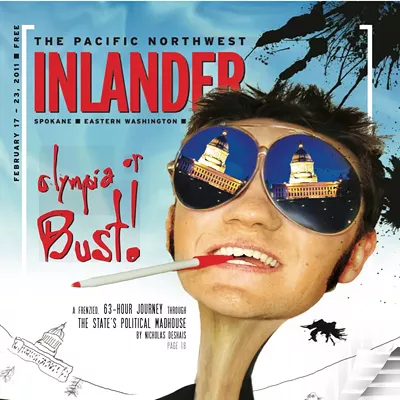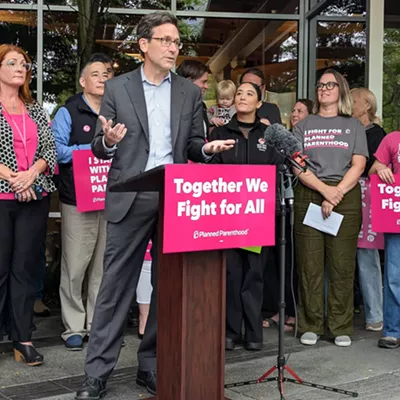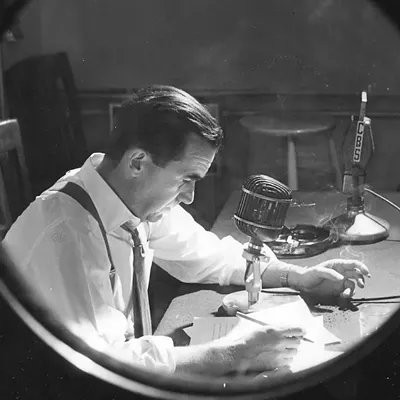
Extended one-party government, whether Republican or Democratic, is a petri dish for arrogance and contempt. Unfortunately, arrogance and contempt for local communities and the voting public were on full display during this recent legislative session in Olympia.
The Democrats' opposition to letting local governments regulate the distribution of drug paraphernalia, such as needles, is but one example of the Legislature failing to criminalize drug possession.
In 2021, the Washington Supreme Court threw out a law that considered drug possession a felony. The Legislature enacted a temporary measure to ensure drugs remained illegal, but gave themselves a July 2023 deadline to pass a permanent solution. With the deadline looming, this year's Legislature needed to act, and it could have: A deal was within reach. That deal would have considered drug possession a misdemeanor or gross misdemeanor, would have allowed local governments to restrict needle exchanges and the distribution of drug paraphernalia, would have required notifying neighborhoods before an opioid treatment facility was built in their community, and would have prohibited co-mingling in those facilities people seeking treatment with those continuing to use drugs.
But Democrats could not abide giving local governments the authority to restrict the distribution of needles, nor abide giving neighborhoods a heads-up when a drug facility was planned for their backyards. Despite Democratic control of the Legislature and the governor's office, no bill passed.
The governor has called a special legislative session later this month to address this issue, but if a bipartisan deal is to be struck, it needs to allow different communities to make different choices, rather than imposing an Olympia-issued, one-size-fits-all solution across the state.
Based on the governor's approach to salmon recovery, it's uncertain whether Democrats will allow local governments to make decisions based on local conditions. This past session, many Democrats seemed to believe that a Democratic Party-controlled state government knows what's best.
That is not conjecture. It is essentially what the governor's representative told a legislative committee.
This year, Washington state had a unique opportunity to pass a bill that would have restored salmon runs on privately owned farm, timber and ranch lands. The bill was largely drafted by agricultural and tribal interests working side by side, and it was passed out of committee with bipartisan support. Still, many Democrats and the governor opposed the bill because it gave local conservation districts, not agencies in Olympia, the authority to approve projects based on local conditions. The governor's representative said state regulatory agencies were "the ones most familiar with what is needed." Local conservation district officials working with the local farmers, ranchers and timber owners being the ones making decisions based on local conditions was not acceptable.
In the end, some funds were inserted in the budget to be used by local conservation districts for salmon habitat restoration, but funds were also included to protect centralized agency control.
It appears a Democratic Party tenet, even if unspoken and perhaps even denied, that decisions affecting local communities should not be entrusted to them, but should be made for them by a single-party controlled state government. Even worse, the people's ability to see into how this one-party state government operates behind closed doors should be limited. That was evident in recent weeks.
Democratic legislative leaders continued insisting the voter-approved Public Records Act, a law that requires government officials to retain and make available their records, including emails and texts, doesn't apply to them. The Democrats think they are above it. In 2019, the state Supreme Court ruled that the Legislature was not exempt and needed to comply with the law. Still, this past session, Democratic leaders and staff were blacking out records before publicly releasing them.
With Democrats in full control of the Legislature and the governor's office, they could have adopted measures to bring the Legislature into compliance with the Public Records Act, but they refused. So the matter is back before the state Supreme Court.
Our democracy works best when it engages local communities and acknowledges the differences across our state — and when it operates in the open, so people know what their government is deciding and can get involved in that decision-making.
The arrogance and contempt for local communities shaping policy, and for the public's right to know what their legislators are doing, is inconsistent with Washington's tradition of populist, transparent government. Democrats in Olympia would be well served to remember that as we head into another election year, but they probably won't. They're counting on you not caring. ♦
Bill Bryant, who served on the Seattle Port Commission from 2008-16, ran against Jay Inslee as the Republican nominee in the 2016 governor's race. He is chairman emeritus of the company BCI, is a founding board member of the Nisqually River Foundation and was appointed by Gov. Chris Gregoire to serve on the Puget Sound Partnership's Eco-Systems Board. He lives in Winthrop, Washington.





















